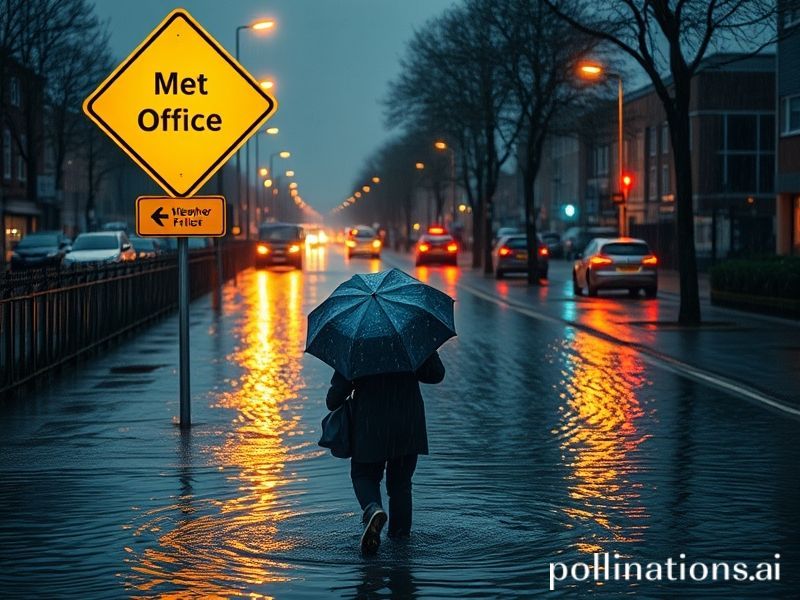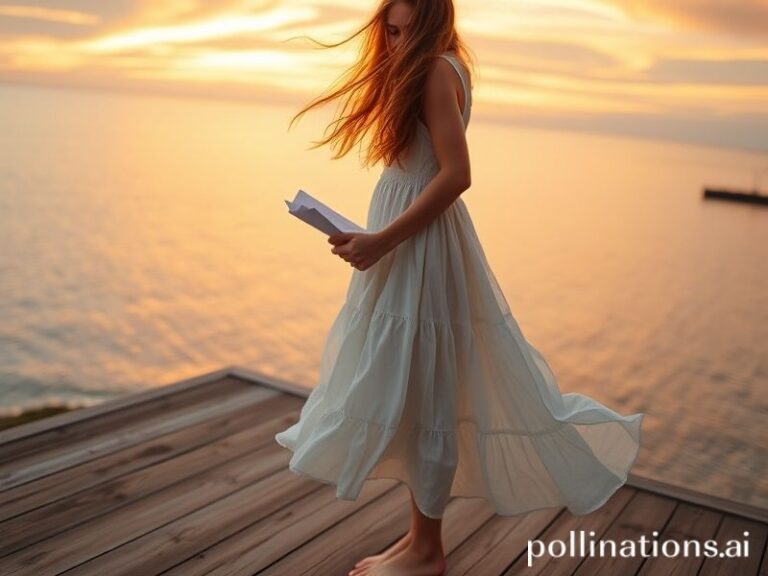Storm in a Teacup? How Britain’s ‘Yellow Rain Warning’ Became the World’s Favourite Meteorological Soap Opera
London, England – Somewhere between the third scone and the fourth cup of tea, the United Kingdom’s Met Office issued yet another yellow warning for rain, a meteorological advisory so routine that bookmakers now refuse to take bets on whether it will appear before the Queen’s face on a ten-pound note. From the vantage point of a planet currently flirting with four degrees of warming, the British Isles’ soggy tantrum is both quaint and instructive: a reminder that even in an age of megadroughts and biblical floods, the empire that once ruled the waves still can’t rule the drizzle.
To the casual observer abroad, a “yellow warning” sounds like the sort of thing one might give a Labrador retriever. Yet inside the UK, it triggers the same ritualised panic usually reserved for discovering the milk has gone off. Supermarkets empty of sourdough and tinned beans, rail operators apologise in advance for leaves that have not yet fallen, and BBC presenters practise their gravest “weather-is-coming” faces—an expression previously perfected during the Great Toilet Paper Shortage of 2020.
Globally, the sigh is audible. In Sudan, where seasonal rains routinely displace hundreds of thousands, an aide glances at the headline “UK braces for 30 mm” and mutters something unprintable about colonial hydrology. In California, still rationing showers like wartime Parisians, residents scroll past headlines of “torrential downpours” in Devon, wondering if the Atlantic might be persuaded to FedEx some of that surplus westward. Meanwhile, Jakarta, a city sinking faster than Boris Johnson’s approval ratings, offers to send engineers who specialise in “living with water,” an expertise London might find handy once the Thames Barrier decides to take early retirement.
The economic ripples reach further than a Cornish surfer. Lloyd’s of London, ever eager to monetise atmospheric anxiety, has quietly expanded its rainfall derivatives market—essentially a casino where one can hedge against the exact number of damp Tuesday afternoons. German reinsurers watch with Teutonic glee, having calculated that every additional British umbrella sold statistically reduces claims for sun-damaged patio furniture in Munich. And somewhere in Shenzhen, a factory ramps up production of “Keep Calm and Dry On” ponchos, each emblazoned with a Union Jack that bleeds colour the moment it meets precipitation—an unintended metaphor rendered in soluble dye.
Climate diplomats feign concern while secretly grateful for the distraction. A UK delegation arrived at last month’s COP wearing shoes so waterproof they could wade through their own emissions pledges without getting socks wet. Delegates from drought-stricken nations nodded politely, then retreated to the buffet to console themselves with free Scottish salmon—ironic, given salmon now need ladders to climb what’s left of the rivers.
Of course, the real significance lies not in the rainfall totals but in the choreography of reaction. The UK’s infrastructure, once built to repel Napoleon and impress Victorian mill owners, is now chiefly occupied repelling its own weather. A single flooded underpass near Swindon generates more TikTok content than entire humanitarian crises. Each puddle becomes a referendum on public spending, each cancelled train a metaphor for national malaise. It is as if the country has agreed to perform its decline in real time, one damp commuter at a time.
Still, there is comfort in consistency. While glaciers calve and coral reefs bleach to bone, Britain remains dependably moist, a sort of meteorological comfort blanket for a world spinning off its axis. Should the apocalypse arrive, survivors will presumably huddle under a leaking bus shelter somewhere near Slough, reminiscing about the good old days when rain was merely yellow-warning level and not the opening act of Waterworld.
In conclusion, the UK’s latest rain warning is less a forecast than a national lullaby—soft, familiar, and slightly soggy. The rest of us watch, half amused, half envious, aware that in a century of accelerating chaos, the ability to panic politely about drizzle may be the rarest privilege of all. Carry on, Britannia. Your clouds—and your talent for making drama from dampness—remain uniquely exportable commodities. Just don’t expect the rest of the thirsty planet to applaud.







